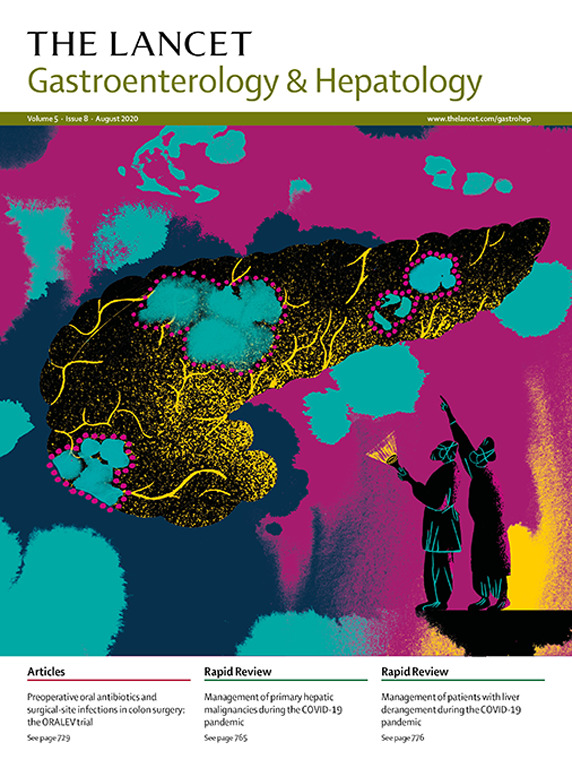Effect of gluten and wheat on symptoms and behaviours in adults with irritable bowel syndrome: a single-centre, randomised, double-blind, sham-controlled crossover trial
IF 38.6
1区 医学
Q1 GASTROENTEROLOGY & HEPATOLOGY
引用次数: 0
Abstract
Background
Many patients with irritable bowel syndrome (IBS) believe gluten or wheat triggers their symptoms. We compared symptomatic responses to wheat and gluten with gluten-free sham challenge in patients with IBS who previously perceived benefit from a gluten-free diet.Methods
We conducted this randomised, double-blind, sham-controlled crossover study at McMaster University Medical Centre, ON, Canada. Eligible participants were adults aged 18 years or older who met Rome IV criteria for IBS and had previously self-reported improvement on a gluten-free diet, which was implemented for at least 3 weeks before enrolment. Eligible participants were randomly assigned (1:1:1:1:1:1) to receive one of six sequences of wheat, gluten, and sham (containing gluten and wheat free flour) in three periods of 7 days, separated by 14-day washout periods. Randomisation was done using the randomizeBE package in R and the cereal bars were designed to have the same appearance, taste, and smell to maintain blinding. The primary outcome was worsening of IBS symptoms of at least 50 points on the IBS Symptom Severity Score (IBS-SSS) after dietary challenges. Outcome and safety analyses were done in all patients who completed all three challenges. This trial was registered with ClinicalTrials.gov, NCT03664531.Findings
Between Nov 15, 2018, and June 19, 2023, we assessed 101 people for eligibility. 72 people were excluded due to ineligibility (n=15), refusing screening (n=42), and refusing participation (n=15). 29 participants were enrolled and randomly assigned to wheat–gluten–sham (n=5), wheat–sham–gluten (n=5), gluten–wheat–sham (n=5), gluten–sham–wheat (n=5), sham–wheat–gluten (n=5), and sham–gluten–wheat (n=4). One participant in the wheat–sham–gluten group completed the first challenge but withdrew without providing a reason. In the 28 patients completing the study, there were no statistically significant differences in the proportion of participants with a worsening of IBS-SSS of at least 50 points after wheat (11 [39%] of 28 participants, risk difference vs sham 0·11; 95% CI –0·16 to 0·35) or gluten (ten participants [36%], 0·07; –0·19 to 0·32) versus sham (eight participants [29%]). Adverse events were reported in 26 (93%) of 28 patients after wheat, 26 patients (93%) after gluten, and 26 patients (93%) after sham. Study emergent adverse events were similar between challenges (five [18%] of 28 participants after wheat, five [18%] after gluten, and seven [25%] after sham). No patients reported severe adverse events.Interpretation
IBS patients with self-perceived gluten sensitivity reacted similarly to gluten, wheat, and sham challenges. These findings suggest that expectations played a major role in symptom generation, and that only some of these patients could benefit from gluten or wheat restriction. Identifying this subset of patients while destigmatising wheat and gluten in the remaining ones should be considered for effective management of patients with IBS.Funding
Canadian Digestive Health Foundation, Society for the Study of Celiac Disease.谷蛋白和小麦对成人肠易激综合征症状和行为的影响:一项单中心、随机、双盲、假对照交叉试验
许多肠易激综合征(IBS)患者认为麸质或小麦会引发他们的症状。我们比较了以前认为从无麸质饮食中获益的IBS患者对小麦和麸质与无麸质假挑战的症状反应。方法我们在加拿大安大略省麦克马斯特大学医学中心进行了这项随机、双盲、假对照交叉研究。符合条件的参与者是18岁或以上的成年人,符合IBS的罗马IV标准,并且在入组前至少实施了3周的无麸质饮食后自我报告有所改善。符合条件的参与者被随机分配(1:1:1:1:1:1),在为期7天的三个时间段内接受小麦、谷蛋白和假面(含谷蛋白和无小麦面粉)的六个序列之一,中间间隔14天的洗脱期。随机化是使用R中的randomizeBE包装完成的,谷物棒被设计成具有相同的外观、味道和气味,以保持盲性。主要结局是饮食挑战后IBS症状严重程度评分(IBS- sss)至少50分的IBS症状恶化。完成所有三项挑战的所有患者都进行了结果和安全性分析。该试验已在ClinicalTrials.gov注册,注册号为NCT03664531。在2018年11月15日至2023年6月19日期间,我们评估了101人的资格。72人因不合格(n=15)、拒绝筛查(n=42)和拒绝参与(n=15)而被排除。29名参与者被随机分配到小麦-谷蛋白-假药组(n=5)、小麦-假药-谷蛋白组(n=5)、谷蛋白-假药-小麦组(n=5)、假药-小麦-谷蛋白组(n=5)和假药-谷蛋白-小麦组(n=4)。小麦-假面-谷蛋白组的一名参与者完成了第一个挑战,但没有提供原因就退出了。在完成研究的28名患者中,小麦治疗后IBS-SSS恶化至少50分的参与者比例无统计学差异(28名参与者中有11名[39%],与假手术的风险差异为0.11;95% CI - 0.16至0.35)或谷蛋白(10名参与者[36%],0.07;- 0.19至0.32)与假手术相比(8名参与者[29%])。28例患者中有26例(93%)服用小麦后出现不良事件,26例(93%)服用谷蛋白后出现不良事件,26例(93%)服用假药后出现不良事件。研究中出现的不良事件在挑战之间相似(28名参与者中有5名[18%]服用小麦,5名[18%]服用麸质,7名[25%]服用假药)。无患者报告严重不良事件。自认为麸质敏感的ibs患者对麸质、小麦和假药的反应相似。这些发现表明,预期在症状产生中起主要作用,只有部分患者可以从麸质或小麦限制中受益。确定这部分患者,同时在其余患者中去除小麦和麸质的污名,应考虑有效管理肠易激综合征患者。加拿大消化健康基金会,乳糜泻研究协会。
本文章由计算机程序翻译,如有差异,请以英文原文为准。
求助全文
约1分钟内获得全文
求助全文
来源期刊

Lancet Gastroenterology & Hepatology
Medicine-Hepatology
CiteScore
50.30
自引率
1.10%
发文量
0
期刊介绍:
The Lancet Gastroenterology & Hepatology is an authoritative forum for key opinion leaders across medicine, government, and health systems to influence clinical practice, explore global policy, and inform constructive, positive change worldwide.
The Lancet Gastroenterology & Hepatology publishes papers that reflect the rich variety of ongoing clinical research in these fields, especially in the areas of inflammatory bowel diseases, NAFLD and NASH, functional gastrointestinal disorders, digestive cancers, and viral hepatitis.
 求助内容:
求助内容: 应助结果提醒方式:
应助结果提醒方式:


